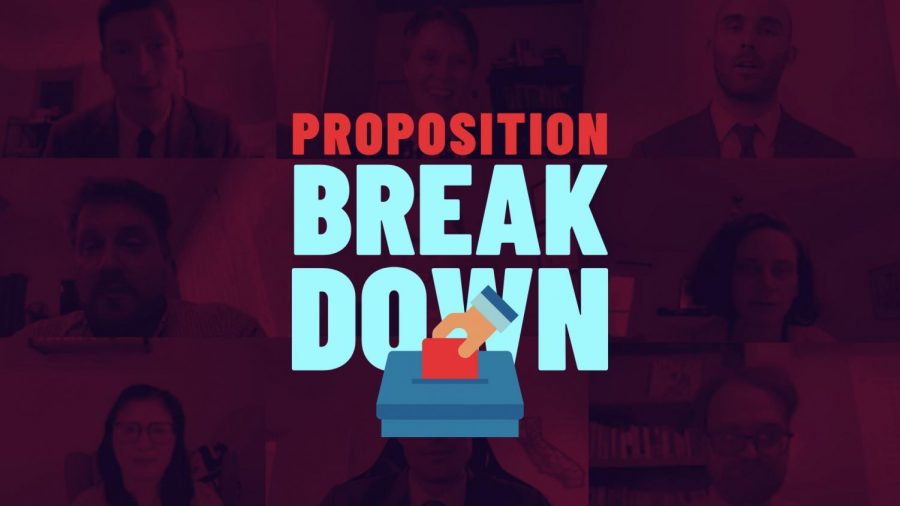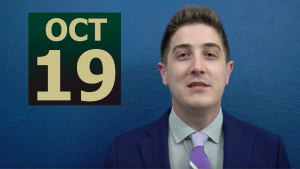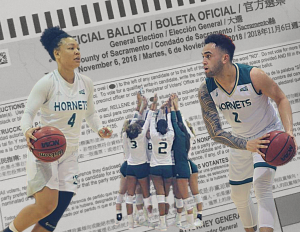Experts explain: California propositions, what they’ll cost
Sacramento Public Library and PIE at Sac State host legislative analysts in virtual event
Staff of the Legislative Analyst’s Office explained the 2020 California ballot initiatives in a virtual event Tuesday evening hosted by the Sacramento Public Library and the Project for an Informed Electorate at Sacramento State. Voters tasked the LAO with providing impartial analysis explaining each initiative after voters approved California Proposition 9 in 1974, according to Jason Constantouros, principal fiscal and policy analyst at the LAO. Background screenshots via Zoom and collage by Jenna Cooper.
October 15, 2020
Staff of the Legislative Analyst’s Office explained the 2020 California ballot initiatives in a virtual event Tuesday evening hosted by the Sacramento Public Library and the Project for an Informed Electorate at Sacramento State.
“We serve all members of a legislature, Democrat and Republican, and also both houses of the legislature, the assembly and the senate,” said Jason Constantouros, principal fiscal and policy analyst at the LAO.
Constantouros said California 1974 Proposition 9 tasked the LAO with providing an impartial analysis explaining each initiative and its proposed fiscal impact on state and local governments.
Read the breakdown of the ballot initiatives from the event below.
Jump to:
- Prop 14 — Stem Cell Research Bonds
- Prop 15 — Business Property Taxes
- Prop 16 — Reinstating Affirmative Action (VIDEO)
- Prop 17 — Voter Rights for People on Parole (VIDEO)
- Prop 18 — Primary and Special Election Voting for 17-year-olds
- Prop 19 — Changed Property Tax Rules
- Prop 20 — Crimes and DNA Collection
- Prop 21 — Rent Control Laws (VIDEO)
- Prop 22 — Ride-hailing and Delivery Company Drivers as Independent Contractors (VIDEO)
- Prop 23 — Dialysis Clinic Requirements
- Prop 24 — Increased Data Privacy (VIDEO)
- Prop 25 — Replacing Cash Bail
Proposition 14 — Stem Cell Research Bonds
“Proposition 14 would authorize the state to sell $5.5 billion in bonds to support an existing program that funds stem cell research,” Constantouros said.
The program was first established in 2004 when voters passed Proposition 71, which approved $3 billion in bonds to fund the research.
“Those funds have largely been spent,” Constantouros said.
Proposition 14 would allow the program to continue its stem cell research and development of new medical treatments.
Constantouros said $1.5 billion of the $5.5 billion would be designated to brain and nervous system diseases such as Alzheimer’s disease and Parkinson’s disease.
Constantouros said the estimated fiscal impact of Proposition 14 would cost the state about $260 million every year for 30 years.
Return to top
Proposition 15 — Business Property Taxes
Proposition 15 would increase property taxes on most owners of commercial properties worth more than $3 million to provide funding for schools and local governments.
Proposition 15 would also reduce businesses’ property taxes on non-real estate property such as equipment and furniture.
LAO deputy legislative analyst Brian Uhler said residential property taxes would not be affected by Proposition 15.
Return to top
Proposition 16 — Reinstating Affirmative Action
Proposition 16 would essentially repeal Proposition 209.
In 1996, voters passed Proposition 209, banning the consideration of race, sex, color, ethnicity and national origin in public employment, public education and public contracting, according to Lourdes Morales, principal fiscal and policy analyst at the LAO.
“Before Prop 209, these five characteristics could be used. For example, race and ethnicity could be used as one of several characteristics in admissions for public universities and colleges,” Morales said.
Proposition 16 would allow institutions considerations based on the five characteristics, but still require them to abide by state and federal laws.
Morales said the fiscal effects of the proposition are dependent on the future actions performed by state and local government entities.
Return to top
Proposition 17 — Voter Rights for People on Parole
Proposition 17 extends voting rights to people who have completed their terms in prison but are still on state parole.
Luke Koushmaro, fiscal and policy analyst at the LAO said with roughly 50,000 people on state parole, there will be increases in workload at a county level and state level.
“At the county level there will be increased workload, there will be additional individuals who register to vote, creating increased workload for county election officials who manage lists of registered voters and validate that all those registered in that county are eligible to vote,” Koushmaro said. “It would also increase workload for the county election officials because there would be increased ballots that would need to be mailed out and all the ballot materials.”
If passed, the proposition would likely cost hundreds of thousands of dollars annually for each county. One-time state costs will also likely be in the hundreds of thousands of dollars, according to Koushmaro.
Return to top
Proposition 18 — Primary and Special Election Voting for 17-year-olds
Proposition 18 would allow 17-year-olds to vote in the primary election and any special elections if they turn 18 by the time of the next general election.
Nick Schroeder, principal fiscal and policy analyst at the LAO, said Proposition 18 would require counties to update the registration systems and process the increased voter numbers.
The estimated fiscal impact of Proposition 18 for counties would range from hundreds of thousands of dollars to $1 million according to Schroeder.
Return to top
Proposition 19 — Changed Property Tax Rules
Proposition 19 would give homeowners who are over 55, severely disabled or who have been impacted by a natural disaster a change in property tax rules.
“First it would allow eligible homeowners to move to a home that is more expensive than their current while maintaining a somewhat lower tax bill,” Uhler said. “Second, it would allow moves to any county in the state instead of the limited number of ones that have voted to participate under current law, and finally, it would increase the number of times a homeowner can use this exception from once in a lifetime to three times.”
Proposition 19 would also narrow the exception for inherited properties by limiting property tax savings to only primary homes and farms.
“Narrowing the inheritance rules would increase property tax revenues, while broadening the exception for eligible homeowners would decrease property tax revenues. Overall, we think property tax would increase,” Uhler said.
Return to top
Proposition 20 — Crimes and DNA Collection
Proposition 20 would allow felony punishment for certain individuals who steal or shoplift property or money worth less than $950, and make changes to Proposition 57 to consider the early release of inmates convicted of nonviolent crimes from state prison. It would also require state and local law enforcement to collect DNA samples from adults convicted of certain misdemeanors, according to Caitlin O’Neil, senior fiscal and policy analyst at the LAO.
O’Neil said the estimated fiscal impact for Proposition 20 would cost tens of millions of dollars annually.
Return to top
Proposition 21 — Rent Control Laws
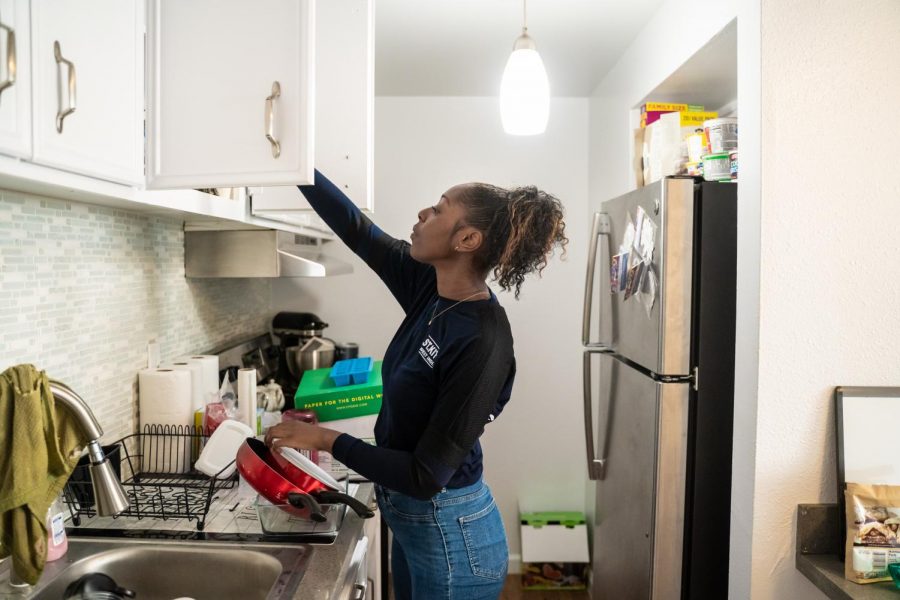
Sac State student Jayda Preyer photographed inside her apartment Thursday, Oct. 17, 2019. Proposition 21 would allow cities and counties to apply rent control to most properties over 15 years old.
Proposition 21 would modify the limitations of the current rent control policies in order for cities and counties to apply rent control to more properties, Morales said.
Morales said the current state rent control policies under the Costa-Hawkins Rental Housing Act have three main limitations:
Rent control cannot apply to single family homes.
Rent control cannot apply to homes built and completed after Feb. 1, 1995.
Rent control cannot dictate what landlords charge a new renter when they first move into a property.
Morales said Proposition 21 would allow cities and counties to apply rent control to most properties over 15 years old and single-family homes owned by individuals that have three or more properties.
Prop 21 would also allow cities and counties to set how much landlords can charge new renters when they first move in as long as they allow landlords to increase rent by 15% over the first three years after new renters move in, according to Morales.
Proposition 21 would affect property tax, sales tax and income tax revenues all dependent on the decisions local governments make to deal with the new rent control policies, according to Morales.
“We do think that there is a potential reduction in state and local revenue in the high tens of millions of dollars overtime, mostly driven by a reduction in property tax revenues for local governments,” Morales said.
Proposition 22 — Ride-hailing and Delivery Company Drivers as Independent Contractors
Proposition 22 would make app-based drivers for ride-hailing and delivery companies independent contractors instead of employees.
Ride-hailing services include app-based bookings for private cars or taxis like Uber and Lyft. Ride-sharing is the term used in the proposition and refers to services that allow booking of shared shuttles, but the proposition would apply to ride-hailing services as well.
“In 2019, the state passed a law that limits what type of work companies can hire independent contractors to perform,” said Chas Alamo, principal fiscal and policy analyst at the LAO. “The state attorney general says that this new law means that rideshare and delivery company drivers must be made employees rather than independent contractors.”.
As employees, app-based drivers have less flexibility with their work schedules, but ride-hailing and delivery companies are required under state law to provide benefits such as minimum wage and worker compensation for workplace injuries, according to Alamo.
If voters pass Proposition 22, app-based ride-hailing and delivery company drivers would become independent contractors, meaning they would create their own work schedules, but they would also pay their own expenses and use their own vehicles for work, according to Alamo.
“The proposition would also provide drivers certain benefits including an earnings minimum, a health insurance stipend for drivers who drive more than 15 hours a week for one company as well as some other benefits,” said Alamo.
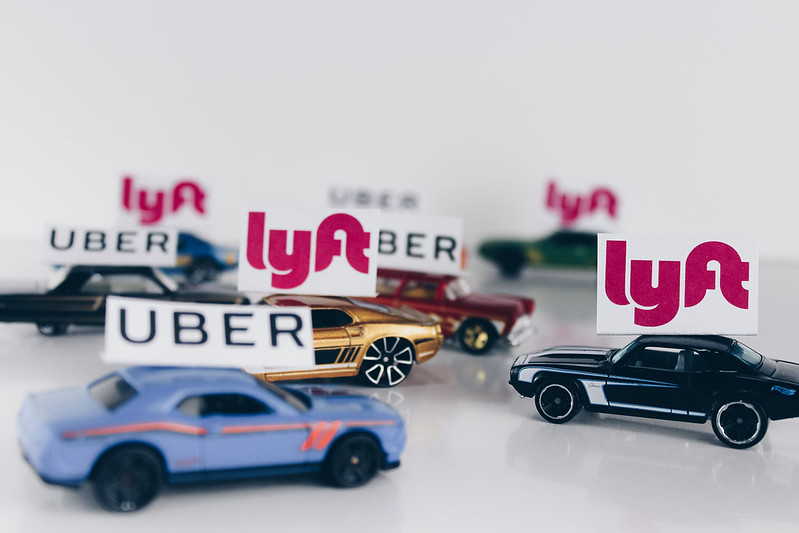
Ride-hailing services include app-based bookings for private cars or taxis like Uber and Lyft. Proposition 22 would make app-based drivers for ride-hailing and delivery companies independent contractors instead of employees. "ride sharing uber lyft" by stockcatalog is licensed under CC BY 2.0
Alamo said there is an expected minor increase of state income tax revenue if Proposition 22 is passed.
“We believe that the measure would result in lower costs and higher profit for the rideshare and delivery companies because these companies would not have to provide the standard benefits and protections state law requires for employees,” said Alamo.
As a result, Alamo said rideshare and delivery fees are expected to be lower as a result of Proposition 22.
Return to top
Proposition 23 — Dialysis Clinic Requirements
Proposition 23 would require a doctor on-site at dialysis clinics during all treatment hours, clinics to report infection data to the federal government and clinics to obtain the consent of the California Department of Public Health prior to closing or substantially reducing services, according to Sonja Petek, principal fiscal and policy analyst at the LAO.
“We estimate that this would increase costs for a clinic by several hundred thousand dollars annually,” Petek said. “The costs to state and local governments could be in the low tens of millions of dollars annually.”
Proposition 24 — Increased Data Privacy
Proposition 24 would expand human privacy rights, giving consumers new rights like the control to have businesses not share their information and personal data, to correct data and to limit sensitive personal data like social security numbers, according to Anita Lee, principal fiscal and policy analyst at the LAO.
Businesses collect information about people from public sources, consumers and other businesses to help in ads, consumer predictions and providing services, Lee said.
“It does create a new state agency to complement the California Department of Justice,” Lee said. “The new state agency would be responsible for developing regulations as well as enforcing the laws.”
The estimated fiscal effects for Proposition 24 would include increased state costs to the California Department of Justice, courts and DOJ enforcement for cases concerning violations of privacy laws, according to Lee.
“The increased state costs associated for the new state agency would be at least $10 million. The proposition actually specifically requires an appropriation of that amount,” Lee said.
Return to top
Proposition 25 — Replacing Cash Bail
Proposition 25 would eliminate the cash portion of bail and replace it with risk assessments, court hearings or automatic release.
“No one would be charged fees on condition of release,” Lee said. “There can be conditions for release on individuals who are considered medium risk to high risk or if the judge deems that it is appropriate.”
Lee said the fiscal effect for the new pretrial release process is estimated to be in the mid-hundreds of millions of dollars dependent on how the process is being implemented.
“In terms of the county jail costs, it would be a decrease possibly in the high tens of millions of dollars annually,” Lee said.
Return to top






























































































































